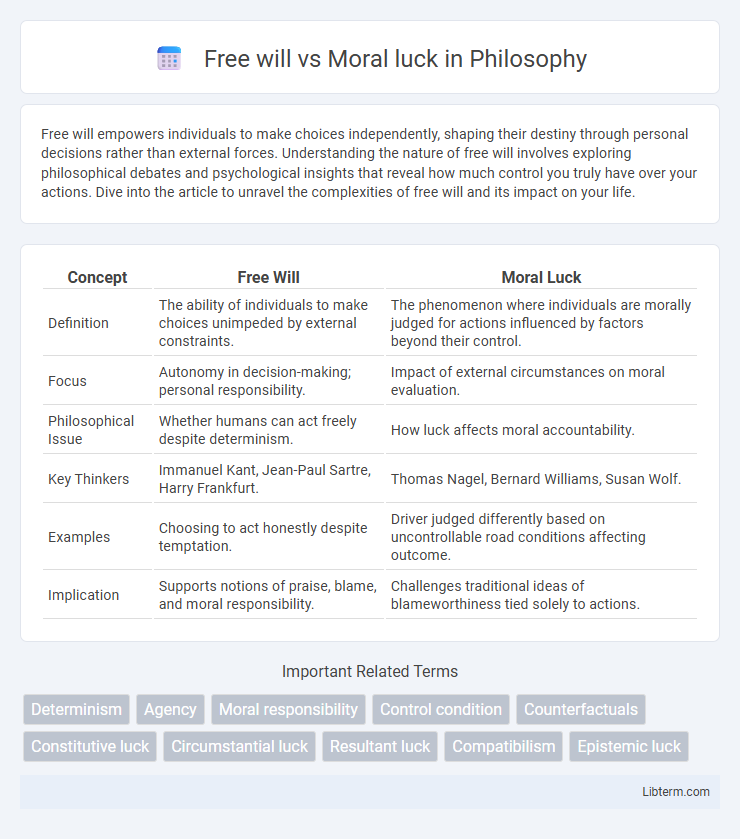Free will empowers individuals to make choices independently, shaping their destiny through personal decisions rather than external forces. Understanding the nature of free will involves exploring philosophical debates and psychological insights that reveal how much control you truly have over your actions. Dive into the article to unravel the complexities of free will and its impact on your life.
Table of Comparison
| Concept | Free Will | Moral Luck |
|---|---|---|
| Definition | The ability of individuals to make choices unimpeded by external constraints. | The phenomenon where individuals are morally judged for actions influenced by factors beyond their control. |
| Focus | Autonomy in decision-making; personal responsibility. | Impact of external circumstances on moral evaluation. |
| Philosophical Issue | Whether humans can act freely despite determinism. | How luck affects moral accountability. |
| Key Thinkers | Immanuel Kant, Jean-Paul Sartre, Harry Frankfurt. | Thomas Nagel, Bernard Williams, Susan Wolf. |
| Examples | Choosing to act honestly despite temptation. | Driver judged differently based on uncontrollable road conditions affecting outcome. |
| Implication | Supports notions of praise, blame, and moral responsibility. | Challenges traditional ideas of blameworthiness tied solely to actions. |
Introduction to Free Will and Moral Luck
Free will refers to the capacity of individuals to make choices unconstrained by external forces, emphasizing personal agency and responsibility. Moral luck challenges this notion by suggesting that factors beyond one's control influence moral judgment and outcomes. This debate explores the tension between autonomy in decision-making and the impact of unforeseen circumstances on ethical accountability.
Defining Free Will: Autonomy and Choice
Free will is defined as the capacity of individuals to make autonomous choices independent of external constraints or deterministic influences. Autonomy in free will emphasizes self-governance, where actions stem from an internal deliberation process reflecting personal values and intentions. This concept challenges the impact of moral luck, which considers how factors beyond one's control affect moral judgment and responsibility.
Understanding Moral Luck: Key Concepts
Moral luck challenges traditional notions of free will by highlighting how various uncontrollable factors influence moral judgments and responsibility. Key concepts include resultant luck, which pertains to outcomes beyond one's control, and circumstantial luck, involving the situations individuals face that shape their actions. Recognizing these dimensions reveals the complexity in assessing moral accountability when outcomes and contexts beyond an individual's control impact ethical evaluations.
Types of Moral Luck Explained
Moral luck refers to situations where individuals are judged morally despite factors beyond their control influencing the outcome. Four primary types include resultant luck, which concerns outcomes of actions; circumstantial luck, involving the situations one faces; constitutive luck, related to one's character and disposition; and causal luck, dealing with the chain of events leading to an action. These distinctions challenge the traditional notion of free will by highlighting how external circumstances impact moral responsibility.
The Tension: Free Will vs. Moral Luck
The tension between free will and moral luck arises from the conflict between individual autonomy and external factors influencing moral responsibility. Free will emphasizes control over one's actions, while moral luck highlights how outcomes beyond one's control shape judgments of praise or blame. This interplay challenges the coherence of assigning moral accountability solely based on voluntary intentions.
Philosophical Perspectives on Responsibility
Philosophical perspectives on responsibility often explore the tension between free will and moral luck, where individuals are held accountable despite factors beyond their control influencing their actions. Discussions in this field question whether true moral responsibility can exist if outcomes are partly determined by luck rather than intentional choice. Prominent philosophers like Thomas Nagel and Bernard Williams analyze how moral luck challenges traditional notions of autonomy and blameworthiness.
Notable Thought Experiments and Examples
The concept of free will versus moral luck is critically examined through notable thought experiments such as Thomas Nagel's example of two drivers, one who hits a pedestrian due to unforeseeable circumstances and another who does not, highlighting outcomes beyond individual control. Another prominent case involves Nagel's differentiation between resultant moral luck, where consequences affect moral judgment, and circumstantial moral luck, concerning the situations that shape a person's actions. These scenarios illuminate the tension between autonomy in decision-making and external factors influencing moral responsibility.
Implications for Ethics and Justice
Free will versus moral luck profoundly impacts ethics and justice by challenging the assumption that individuals are solely responsible for their actions. When external factors beyond personal control influence outcomes, assigning moral praise or blame becomes complex, requiring legal and ethical systems to balance fairness with accountability. This tension prompts reconsideration of punishment severity and the extent to which intentions versus consequences shape moral judgments.
Contemporary Debates and Criticisms
Contemporary debates on free will versus moral luck center on whether individuals can be justly held accountable for actions influenced by factors beyond their control, challenging traditional notions of moral responsibility. Philosophers like Thomas Nagel and Bernard Williams emphasize how luck in circumstances and character traits complicates the assessment of moral praise and blame. Critics argue that acknowledging moral luck undermines the concept of free will while prompting revisions in legal and ethical systems to accommodate this tension.
Conclusion: Bridging Free Will and Moral Luck
Free will and moral luck are intricately connected through the recognition that individuals' choices are shaped by factors beyond their control, challenging the traditional notion of absolute autonomy. A nuanced understanding acknowledges that while free will emphasizes personal responsibility, moral luck highlights the influence of external circumstances on moral evaluation. Bridging these concepts requires integrating the awareness of situational variables with the commitment to ethical accountability, fostering a balanced perspective in moral philosophy.
Free will Infographic

 libterm.com
libterm.com